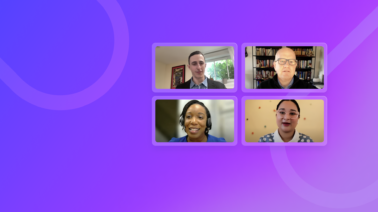
2020 was a year of extraordinary challenges, and there’s no denying that the pandemic created enormous hardships and forced individuals to make many difficult decisions. At the same time, despite this disruption in our daily lives, I was very encouraged that people continued to find ways to learn and grow. Over the course of 2020, Udacity doubled down on helping our students find the courses they needed to prepare themselves for a brighter future.
Last year, we reached milestones of 14 million users, 1.5 million projects completed, and over 170,000 Nanodegree certificates awarded, and are happy to celebrate over 50,000 graduates in 2020 and some exciting updates.
2020 was a big year of growth for Udacity as a business. In the first half of 2020 alone, our enterprise and government bookings rose with a 260% increase in annual recurring revenue — and we recently secured $75 million in financing to help support this incredible growth, doubling our Sales and Customer Success teams.
Over the past 12 months, we’ve also welcomed a number of new team members to help us maintain this incredible trajectory with enterprise customers, including CFO Seamus Hennessy, CMO Kenny Kim, SVP of Global Enterprise Sales Blake Tablak, and our newest team member who joined in early 2021, SVP of Global Customer Success and Operations Jennifer Dearman.
But I measure our success not just in numbers but in how we changed the lives of individuals, the fortunes of our enterprise customers, and the economic prospects of the governments we work with.
Creating Opportunities Where They’re Needed the Most
Our mission has always been to empower individuals to achieve their career goals. By partnering on scholarship programs with 20 companies and organizations, we were able to work with some of the world’s biggest companies, such as Amazon Web Services and AT&T, to help connect learners with the skills they need to succeed in new careers while simultaneously helping to close the incredible skills gap we continue to see in emerging technologies. To continue this momentum, we’ve also launched a new team motivated to work with corporate social responsibility departments and foundations to offer scholarships to underserved communities around the world.
I am also incredibly grateful that, as a company, we were able to respond to the challenges that so many faced in 2020 through Udacity-led scholarship initiatives aimed at addressing urgent needs and encouraging greater diversity in today’s tech-first workplaces. In March, Udacity was among the first companies to respond to those who lost their jobs due to COVID-19. As an extension of our Pledge to America’s Workers, we quickly introduced a Nanodegree scholarship program to provide skills training to those who were laid off.
This past summer we also launched our Pledge to Equality Scholarship Program to increase educational and professional opportunities for underrepresented communities. As our first initiative, we offered 1,000 Nanodegree scholarships to the Black community here in America, providing access to in-demand skills that can open up pathways to new careers. As part of this program, we will welcome the top five graduates into Udacity’s internship program in 2021, giving them relevant job experience that puts their new skills to work.
Changing the Way the World Does Business
Udacity has developed an incredible customer base as we head into 2021, including the world’s leading pharmaceutical company, five of the world’s top seven aerospace companies, three of the Big Four professional services firms, Egypt’s Information Technology Industry Development Agency, and three of the four branches of the United States Department of Defense.
This continued growth in enterprise speaks volumes about the need for (and engagement with) digital transformation across industries. By investing in skills training and new opportunities for their existing workforce, employers and other organizations are able to take advantage of today’s leading technologies to critically inform their decision-making and business activities.
Advancing Technical Literacy in Leadership
Powering digital transformation across an organization isn’t just engineers and analysts — leaders also need to be literate in these technologies if they want to communicate effectively with their teams. This year, we launched our first two executive programs aimed at filling this crucial need: the AI for Business Leaders program to help executives understand how they can leverage AI across their business, and Data Science for Business Leaders to help them address human capital, management and technological challenges.
Delivering Skills at the Speed of Technology
As tech evolves, so too do the capabilities and needs of businesses in response. To help address the many newly emerging skills for which there are still far too few applicants, we have introduced a number of new Nanodegree programs in 2020, including AI for Healthcare, Product Management and our Intro to Cybersecurity.
We’re strong believers that the success of our learners will positively impact the organizations and societies they play a part in. We’ve been fortunate to have continued our growth and success this year, and we’re happy to share this growth with our students and graduates through the expansion of our courses.
This year, we hope you continue to learn new things and pass them forward. We wish you a year of growth, and are excited to share more updates with you in 2021.



